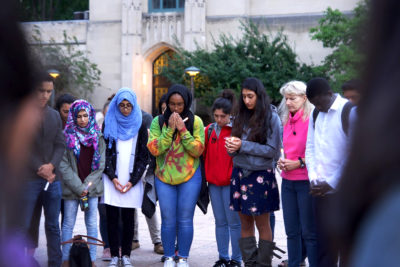
Holding candles and bundled against the windy weather, over 40 students gathered on Marsh Plaza Thursday evening in a vigil to pay respects to the Rohingya victims in Myanmar and Bangladesh.
The vigil was co-organized by several BU student organizations, including the Islamic Society of Boston University, the Bangladeshi Students’ Association and the South Asian-affiliated groups, Iota Nu Delta Fraternity and Delta Phi Omega Sorority.
Over the last month, over 400,000 Rohingya have fled from “terrible persecution” in Myanmar to refugee camps in Bangladesh, the Associated Press reported. Over half of the refugees are children, many of them traumatized or orphaned by the violence.
“It’s a global issue that doesn’t receive a lot of attention. It’s been going on for the past couple of years but really only now being covered by mainstream media,” Islamic Society President Shmyle Ghumman said before the vigil.
Organizer Anima Anwar, the president of DPO, said she hoped the vigil would help bring awareness to the Rohingya crisis.
“Change starts with students like us who are just about to take off in the world,” Anwar said before the vigil. “It’s important, in this country especially, we shouldn’t forget to be activists, and we shouldn’t forget to make the proper choices.”
BSA President Raina Hasan added that democratic societies should feel obliged to raise awareness of such situations as the plight of the Rohingya.
“It would be hypocritical of us to ignore crises like this all over the world when we are constantly pointing our finger at countries for not upholding democratic values and liberal ideals,” Hasan said before the vigil.
Lul Mohamud, a College of Arts and Sciences junior, opened the vigil by calling upon attendees for a moment of prayer and reflection on behalf of those suffering on the other side of the world.
“We stand to send a message of life and hope not only for our Rohingya brothers and sisters, but also to one another here and now,” Mohamud said. “I ask you all to allow to envelop yourself in the healing power of silence.”
Speakers encouraged students to continue supporting refugees and speaking out about injustices.
After the 20-minute vigil, speakers urged students to stay active in raising awareness of the crisis. Several students said they felt it was important to bring attention to human rights crises like the Rohingya conflict.
Sana Rana, a Sargent College of Health and Rehabilitation Sciences sophomore, said she thought the media has waited to discuss the Rohingya crisis until now is because the affected group is a minority population.
“From personal experience, I feel like people just brush it off, but it is a major issue since it is affecting so many people,” Rana said.
Rana added that she liked how the vigil addressed the need to educate people and raise awareness on and off campus about the crisis.
“We have to be multicultural and able to support people from different cultures, not just our own, so that we can show that we are also globally aware of what’s going on,” Rana said.
Gana Ndiaye, a first-year doctoral student in the Graduate School of Arts and Sciences, said he went to the vigil to show solidarity both as a Muslim and as a human.
“To all the people who are suffering around the world, whether it is Muslims or other people, where there is mobilization to show solidarity to advocate for human rights, I am there,” Ndiaye said.
School of Education alumna Barbara Wilhelm said she came to the vigil to learn more about the history of the crisis. She said that it’s critical that the world recognize the plight of the Rohingya.
“The way that government and society work is, you can’t be silent,” Wilhelm said. “You really have to raise your voices and you have to have a presence and speak up when there’s something going on that’s horrible, and I think this vigil did that very respectfully.”




















































































































